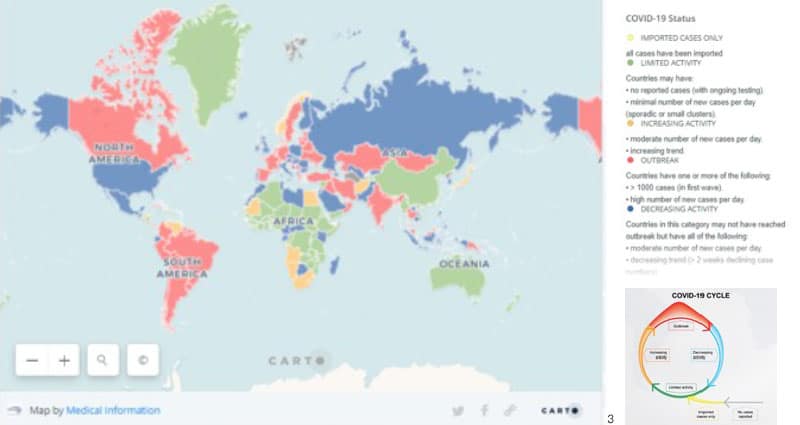3 Things To Keep Your Eye on as Global Business Aviation Begins To Rebound

Since COVID-19 first entered our world in January 2019, it has taken us on quite a roller coaster ride with plenty of twists and turns. Few would have thought that we would still be in that situation over a year later, but here we are. It has been a challenging time for the aviation industry, but with global business aviation activity up 28% compared to 2020, down only by 9% compared to 2019 year to date1, it looks as if our rebound is here.
In December 2020, TripIt surveyed more than 3,200 U.S.-based users to understand their 2021 travel plans.2 Of the 94% of survey respondents that said they plan to travel in 2021, taking a vacation was the most popular reason to travel (73%), followed by a trip to visit family and friends (53%) and a business trip (43%). Of the 43% travelling for business, 71% of them planned to travel by air.
These are highly positive signs for our industry. It illustrates that not only are businesses ready to send their employees travelling again, but that employees have the confidence to do so.
However, as operators, there are still factors to remain vigilant about. Depending on the country in which you live, you may have a different view of where we are in this pandemic. But when you look at the status of each country plotted on a map, it is easy to see that COVID is still very much present in the global landscape.

While we see increased traveller confidence, business willingness and flight activity, COVID is not ready to let us off the roller coaster just yet. Here are three things that MedAire is watching closely and recommends operators do too.
#1 Travel Restrictions
Every day, more countries are dropping, modifying or adding restrictions. Trip planning, which should include risk mitigation and contingency strategies, is more critical than ever because of this, even for destinations once considered routine. MedAire has received multiple calls from operators needing advice on a new diversion point en route because their original destination and diversion location had changed entry requirements while their aircraft was airborne. Having a reputable source you can go to for up-to-date information on entry and exit requirements is just as important today as it was 12 months ago.
Tied to this is topic is the requirement for a negative COVID test upon entry into the U.S. Flight crews are excluded from this requirement; however, there is confusion over whether a crew member deadheading back on a commercial flight is excluded. MedAire has seen no consistency in accepting or denying boarding for private aviation crew in this scenario. Our recommendation is always to prepare for a commercial flight with a negative test result to reduce the need to secure a last-minute COVID test.
#2 Mask Mandates and Guidance
Recently, the CDC announced changes to its mask guidance. The new guidance states that fully vaccinated individuals no longer need to wear a mask outdoors or indoors. However, federal mask mandates that went into effect on February 1, 2021 (extended through September 13) for individuals travelling in the U.S.—including at airports, on commercial aircraft and other modes of mass transit—are still in place. So, where does this leave private aviation?
While the rule never covered private aviation, MedAire advocated the use of masks both in the cockpit and private aircraft cabin since the beginning of the pandemic. This new guidance means that fully vaccinated crew and passengers can go maskless.
The question many operators now face is whether or not to ask for proof of vaccination. The latter can be a delicate situation. MedAire’s doctors advise that if you can’t ask for proof, it is safest to keep mask-wearing requirements in place. It is also important to remember that each country has its guidelines regarding masks that will need to be followed off the aircraft. This leads us to the last point.
#3 Getting Vaccinated and Vaccination Status
The WHO and leading public health agencies worldwide all recommend getting the first vaccine you can as soon as you can get it. While there have been some concerning adverse reactions with some of the vaccines being utilized, it is essential to remember that these numbers are small when looking at the total vaccinated population, and certainly less worrying than the complications of the disease itself. The vaccines are very safe and highly effective.
As mentioned in point 2, vaccination status is undoubtedly a topic with many moving pieces and opinions. Some believe that requiring proof of vaccination for travel promotes inequality for underserved countries. Others believe that international travel will never fully recover until there is a universal way to prove vaccination status. In fact, in that same December TripIt survey, 81% of travellers said the prospect of a digital health passport that provides proof that you’ve been vaccinated was appealing.
Those travellers said they’d be willing to use a digital health passport if it meant they could travel freely. Whatever you believe, some countries are already saying they will require proof of vaccination for entry and are working on making the process seamless on entry. This is an area we must keep our eyes on as it will undoubtedly impact the way we prepare for travel.
This is not an exhaustive list, of course. We must still be aware of the availability and standard of medical care in areas with increasing activity or outbreak COVID levels. We still see social unrest and political impacts of COVID, among other things. It is vital to have a trusted partner or source to go to for up-to-date information on any area to which you are planning to travel. The good news is that we are at a stage in this ride where we can plan and travel with confidence.
Resources
1 WINGX’s weekly Business Aviation Bulletin for April 2021
2 Tripit “Summer Vacation Forecast: Air Travel Confidence Building, but Road Trips Still Reign” March 16, 2021, https://www.tripit.com/web/blog/news-culture/summer-vacation-forecast-air-travel-road-trips.html
3 International SOS Public Access COVID Website, https://pandemic.internationalsos.com/2019-ncov/covid19-locations-with-cases

Flight departments around the world rely on MedAire, an International SOS company, to reduce their travel safety risks. Crews are trained on the resources to manage in-flight illness and injury with onboard medical equipment and telemedicine assistance. On the ground, passengers and crew have one resource for medical referrals; guaranteed payments for medical expenses; assistance with lost documents and prescriptions; online and e-mail travel advisories; evacuation support and a host of other services.
http://www.medaire.com/
© 2025 MedAire Worldwide. All Rights Reserved.
Next ArticleRelated Posts

Peer Support Programs: Transforming How Aviation Addresses Mental Health
While the industry has evolved in acknowledging these issues, stigma still impedes many from seeking available resources. Here, the significance of Peer Support Programs (PSPs) has been increasingly recognized. These initiatives offer a confidential haven where concerns can be openly discussed, free from judgment.

Understanding the Challenge of Turbulence-Related Injuries in Business Aviation
The challenge of managing air turbulence in business and private aviation is becoming increasingly evident due to the growing number of turbulence-related incidents affecting aircraft operators across the industry.

